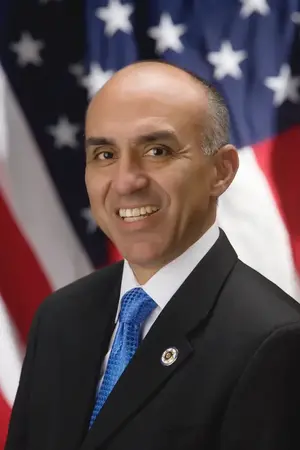
The U.S. District Court handling the Apple-FBI encryption case today published the entire amicus curiae brief from San Bernardino County District Attorney Michael Ramos in support of the U.S. government. And oh, is it contentious.
Ramos, an elected official in the county where the shootings took place in December, takes several shots at Apple specifically. Under a section boldly entitled, “Apple’s assertion of standing to protect privacy is illusory,” he questioned how Apple can suggest that it offers what he calls absolute privacy.
“While Apple can represent what it chooses in its marketing of its devices and operating systems, Apple is neither the legislature nor judiciary empowered to define privacy as absolute,” he wrote. “Apple is not a public policy maker. Apple is a for-profit corporation. No one has appointed or elected Apple to be the Orwellian arbiter or definer of privacy for society or even for all of Apple’s customers.” And anyway, Ramos wrote, this “absolute privacy” isn’t supported by the Constitution.
Ramos is supporting the U.S. government through legal briefs alongside Federal Law Enforcement Officers Association, the Association of Prosecuting Attorneys, National Sheriffs’ Association, and other entities. Several technology companies, including Box, Facebook, Google, and the defunct encrypted email service Lavabit, have filed briefs in support of Apple in the case.
In Ramos’ filing, he took issue with the way Apple has brought up several topics that aren’t actually before the court. One example is the prospect of identity theft that could result if Apple were to unlock San Bernardino shooter Syed Rizwan Farook’s iPhone. “Unwarranted government surveillance” is another matter that isn’t actually at the core of the case, Ramos argued. However, afterwards, Ramos brought up certain “criminal” things that he said iPhones do currently harbor, even though they are not directly being debated in the case.

Above: San Bernardino County District Attorney Michael Ramos.
Image Credit: San Bernardino County
“Apple’s expressed concerns that criminals may attempt to intrude into iPhones and acquire information contained on the phone has some merit, however, it is not the complete picture,” Ramos wrote. “The fact is that criminals area already using iPhones, every day, everywhere, and that those phones contain evidence of their criminal activity of violent crimes, human trafficking, s3xting, revenge p*rnography, child s3xual exploitation, and identity theft committed against innocent victims, and that the evidence resides only on the iPhone. This is real evidence of crimes. It is not grocery lists or restaurant reviews that are at issue.” (Side note: S3xting between consenting adults is not necessarily illegal. To be fair, legal issues do arise in certain states when minors are involved.)
In making the case it would be appropriate for Apple to solve problems that it created, he wrote that companies that make dangerous things have to fix them, and “it can be argued that the iPhone with its current encryption is dangerous to victims.”
nline yesterday, mentioned that Farook’s iPhone “may contain evidence … that it was used as a weapon to introduce a lying dormant cyber pathogen that endangers San Bernardino County’s infrastructure … and poses a continuing threat to the citizens of San Bernardino County.” The passage received media attention. The actual amicus brief, unfortunately, did not elaborate on that particular statement.
What Ramos did make sure to include is a footnote pointing out that the U.S. District Court made an error in the caption for the case, which has been subsequently repeated in each filing. “Although correctly recorded in the search warrant attached to the United States Attorney’s Ex Parte application to compel, the vehicle license plate noted in the court caption is incorrect. The correct number is California 5KGD203,” Ramos wrote.